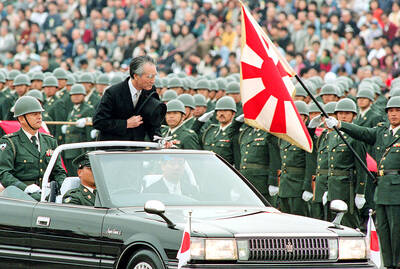Go on the Internet to make friends — and world peace.
That was the message on Thursday from a New York conference on the potential power of Internet social networking tools like Facebook to counter terrorism and repressive governments.
“New technology gives the United States and other free nations a significant advantage over terrorists,” US Undersecretary of State James Glassman told Web entrepreneurs and human rights activists at New York’s Columbia University Law School.
An extraordinary example of e-power was the success on Feb. 5 this year of a grassroots march organized on the Internet against Colombia’s Revolutionary Armed Forces of Colombia (FARC) leftist guerrillas.
Oscar Morales, founder of “One Million Voices Against the FARC,” described how his rallying call to 100 Facebook friends multiplied to 1,500 in less than a day.
“The next day there were 4,000, then 8,000. In just one week it grew to the amazing number of 100,000,” he said.
Within a month the anti-FARC movement was able to field 2 million demonstrators around the globe, including 1.5 million in the Colombian capital Bogota.
Supporters believe Internet-based communities are exactly what violent underground groups and repressive regimes fear.
“The Internet world of the extremists is one of direction — ‘think this, do that,’” Glassman said. “Extremists can’t adapt to the social networking because it shakes their rigid ideologies.”
Even countries with heavy censorship can’t resist, Facebook co-founder Dustin Moskovitz said.
“China pours billions of dollars into the firewall only to have its citizens develop new ways to circumvent it,” Moskovitz said. “Control of these mediums is, in the long run, not a battle they can win.”
Still, for all the talk, it appeared clear that worldwide justice is a little more than just a click away.
An Egyptian journalist, who asked not to be identified because he fears for his safety, told the conference that Facebook had been crucial in the organization of rare protests in April.
“It allowed us to have a platform to convene, because we are not allowed to meet otherwise,” he said.

A missing fingertip offers a clue to Mako Nishimura’s criminal past as one of Japan’s few female yakuza, but after clawing her way out of the underworld, she now spends her days helping other retired gangsters reintegrate into society. The multibillion-dollar yakuza organized crime network has long ruled over Japan’s drug rings, illicit gambling dens and sex trade. In the past few years, the empire has started to crumble as members have dwindled and laws targeting mafia are tightened. An intensifying police crackdown has shrunk yakuza forces nationwide, with their numbers dipping below 20,000 last year for the first time since records

EXTRADITION FEARS: The legislative changes come five years after a treaty was suspended in response to the territory’s crackdown on democracy advocates Exiled Hong Kong dissidents said they fear UK government plans to restart some extraditions with the territory could put them in greater danger, adding that Hong Kong authorities would use any pretext to pursue them. An amendment to UK extradition laws was passed on Tuesday. It came more than five years after the UK and several other countries suspended extradition treaties with Hong Kong in response to a government crackdown on the democracy movement and its imposition of a National Security Law. The British Home Office said that the suspension of the treaty made all extraditions with Hong Kong impossible “even if

CAUSE UNKNOWN: Weather and runway conditions were suitable for flight operations at the time of the accident, and no distress signal was sent, authorities said A cargo aircraft skidded off the runway into the sea at Hong Kong International Airport early yesterday, killing two ground crew in a patrol car, in one of the worst accidents in the airport’s 27-year history. The incident occurred at about 3:50am, when the plane is suspected to have lost control upon landing, veering off the runway and crashing through a fence, the Airport Authority Hong Kong said. The jet hit a security patrol car on the perimeter road outside the runway zone, which then fell into the water, it said in a statement. The four crew members on the plane, which

Former Japanese prime minister Tomiichi Murayama, best known for making a statement apologizing over World War II, died yesterday aged 101, officials said. Murayama in 1995 expressed “deep remorse” over the country’s atrocities in Asia. The statement became a benchmark for Tokyo’s subsequent apologies over World War II. “Tomiichi Murayama, the father of Japanese politics, passed away today at 11:28am at a hospital in Oita City at the age of 101,” Social Democratic Party Chairwoman Mizuho Fukushima said. Party Secretary-General Hiroyuki Takano said he had been informed that the former prime minister died of old age. In the landmark statement in August 1995, Murayama said